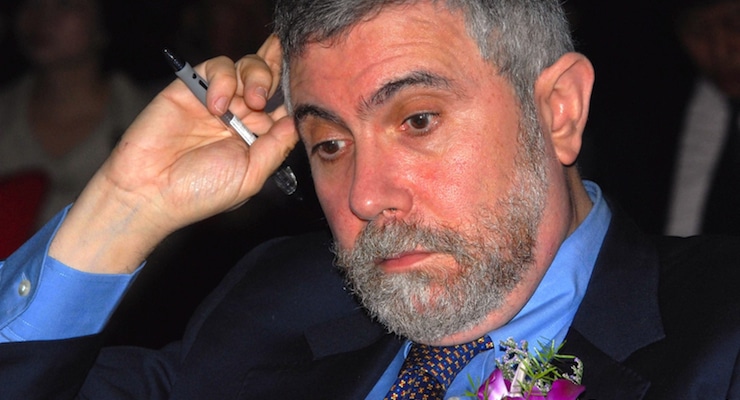

Paul Krugman, partisan economist and professor at Princeton University, gives a speech on May 12, 2009 in Shanghai, China. (Photo by Zhu Lan/ChinaFotoPress/Getty Images)
I spend a lot of time mocking statists, and with good reasons. But since I’m an economist, maybe I should be careful about throwing stones. Especially since, based on a fairly miserable track record, my profession lives in a big glass house.
So, let’s take a closer look to see whether Shakespeare was wrong about which profession most deserved extermination.
We’ll start with a story from The Economist, which informs us that the IMF has a perfect record of failure when predicting recessions.
“The only function of economic forecasting is to make astrology look respectable,” John Kenneth Galbraith, an irreverent economist, once said. …The IMF publishes forecasts for 189 countries twice a year, in April and October, for the year in question and the following one. The Economist has conducted an analysis of them from 1999 to 2014… Over the period, there were 220 instances in which an economy grew in one year before shrinking in the next. In its April forecasts the IMF never once foresaw the contraction looming in the next year. …Our random-number generator correctly forecast the start of a recession 18% of the time.
I’d also add that the IMF has a near-perfect record of trying to undermine countries by recommending tax increases, but that’s a separate issue.
And I don’t mean to pick on the IMF. I’m sure that the forecasts from the Federal Reserve, the Congressional Budget Office, and private entities would show similarly dismal forecasting results. Especially if their models are based on Keynesian theory, as shown in the cartoon in this post.
If an inability to forecast was the worst thing you could say about economists, that wouldn’t be too awful. But it seems that we also have shady ethical values. Consider some findings from a recent academic study.
The present article analyzes the differences between economists and non‐economists with respect to observed corruption behavior… For this purpose, I analyzed real world data of relating to the 109th–111th US Congress between 2005 and 2009, including 695 representatives and senators. I show that those who hold a degree in economics are significantly more prone to corruption than ‘non‐economists’. These findings hence support the widespread, but controversial hypothesis in the ‘economist vs. non‐economist literature’ that economists lack what Frey and Meier (2004) call ‘social behavior’.
Wow, we’re “significantly more prone to corruption” because we lack “social behavior.” That doesn’t sound good.
No wonder fraudsters can easily pass themselves off as economists.
Though maybe that data simply shows that economists with bad morals go into politics, whereas those of us with good character work at places such as the Cato Institute.
Or maybe it’s just evidence that there are too many left-wing economists, as reported in another article from The Economist (though at least the profession isn’t totally dominated by statists, like in anthropology).
A survey conducted in 2003 among practitioners of six social sciences found that…left-leaning economists outnumbered right-leaning ones by three to one, compared with a ratio of 30:1 in anthropology.
In any event, if you want to argue that the world would be better off without economists, the real clincher is that we even have the ability to make sex less fun. At least indirectly, as pointed out in this Quartz article.
Does more sex make people happier? Or do happy people just do it more? A gaggle of economists and statisticians lead by Carnegie Mellon University’s George Loewenstein, a well-known behavioral economist, have done their best to find out.
Their study, published in the Journal of Economic Behavior & Organization, finds that more sex doesn’t always make people happier—especially if the increase is the result of taking part in an economics experiment. …So is more sex now a bad thing? Probably not. The findings seem to indicate that “the instruction to have more sex leads to a decline in wanting for sex and in enjoyment of sex.” … at least we know conclusively whether participation in behavioral economics studies is the best way for married couples to spice things up. The answer is no.
Let’s consider the tally so far.
Economists are 100 percent wrong, they’re crooks, and they even ruin sex for other people.
Not exactly a ringing endorsement.
But as every good economist will tell you, it’s the real world that’s messed up, not our theories.
And for some economists, that’s not just a joke.







Anonymous / January 24, 2016
Krugman hasn’t been at Princeton for years…
/